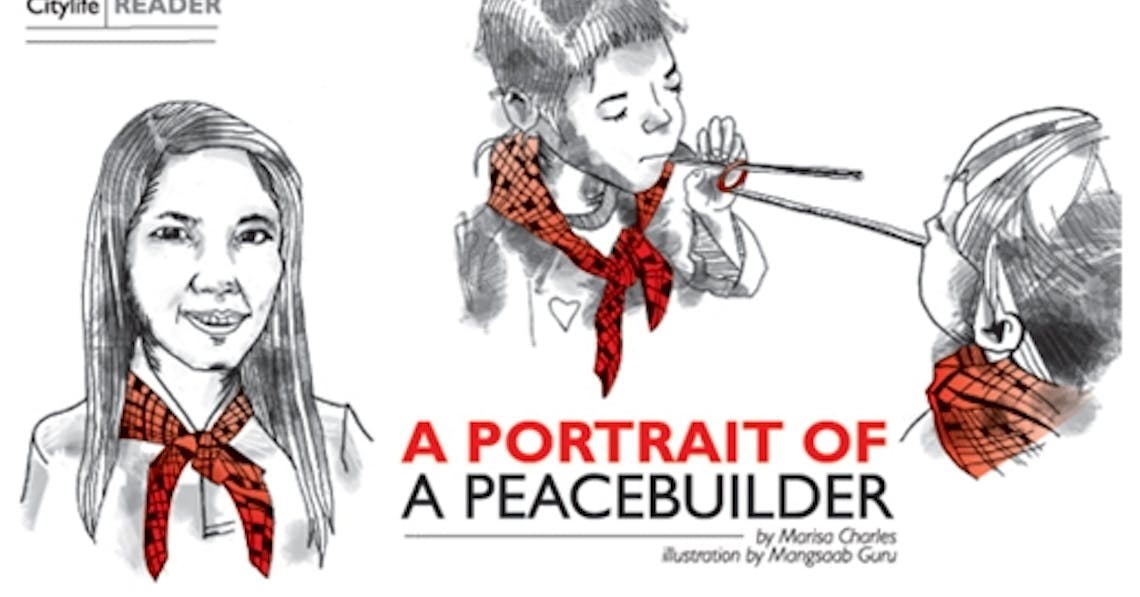When Mother Theresa received the Nobel Peace Prize in 1979, she was asked, “What can we do to promote world peace?” The elderly nun, by then a global icon of peace, replied, “Go home and love your family.”
It was a simple decree and one that Winchana Jitnaruk, would certainly agree with. As Program Coordinator for Peacebuilding Projects at Payap University’s Institute for Religion, Culture and Peace, Winchana recently enlisted 50 youth “ambassadors” to promote peace within their families and communities. Using non-conventional methods such as stories, songs, games and family participation, she engages children in learning about how to respond to anger and violence in their lives.
“So many conflicts in the world today can be traced to attitudes that were formed during a person’s family life,” explains Winchana. “If we begin at the family level, we can address these issues before they emerge in other sectors. I use stories in particular to teach about peace because stories are connected to our past in Thai society. Even beyond Thailand, I believe every human can find lessons in stories.”
While her methods are inherently playful, her approach to peace is rooted in a deep understanding of the profoundly serious nature of conflict.
In fact, her own story of peace began with violence.
Growing up in a village in Phrae, the oldest child of a poor farming family, she was frequently victim of and witness to physical abuse by her alcoholic father. Her grandparents and other relatives on her mother’s side, on the other hand, were caring and helped her to feel loved despite her trauma.
Unfortunately, Winchana’s experience with family violence is far from unique. What is unique, however, is her ability to transform those negative experiences into her powerful motivation to bring positive change to other people’s lives.
“Even though I was surrounded by violence, I also was loved and nurtured. Because I had both experiences, I could compare and see that just because you grow up in the middle of violence, doesn’t mean you have to be a violent part of society,” she says.
As an adult, Winchana began to think about the children who only experienced the violent side of family life. This is what eventually led her to initiate the Youth Peacebuilders Project.
The project, which completed its pilot phase in November, brought together 50 children from Kiew Lae Luang village in Sanpatong District with the aim of strengthening the bonds of trust and intimacy within families. Every Sunday for ten weeks, the group would meet to explore issues such as respect for elders, generosity, open communication, and anger management through entertaining activities and homework assignments. The tasks were especially designed to increase healthy and caring interactions between the children and those around them.
Assignments were at first, rather simple. During the first week, the children had to practice greeting their parents, each morning and evening, with a wai, the traditional sign of respect. Subsequent assignments encouraged the students to help others without being asked or to speak with their parents about their day. For one of the later weeks, students were encouraged to ask their parents about times when they had been angry, thus opening up a space to discuss difficult emotions within the family unit.
“After that week, we got a letter from the parents saying that they were amazed at the changes taking place in their child,” remembers Winchana. “They said that their family had never had conversations like that before. In Thai society there are strict social rules of how family members should behave and also many families are busy with day-to-day survival, this can mean that there is not a lot of closeness between family members.”
Her programe hopes to help children and families to become more comfortable expressing positive emotions. She regularly encourages students to hug one another and her songs emphasise core values of human relationships. When asked for an example of one of her creations, her soft voice sings in Thai, “Have you ever experienced love? It’s easy to give if you start. Give to everyone around you.” Much like her work, the lyrics resonate with a beautiful simplicity.
Yet, as much as she believes in the power of love, Winchana also knows to be pragmatic. To her, “a peaceful village has all the usual conflicts but the people can talk about conflict and don’t deal with it violently. We can’t get rid of conflict 100% but we can understand it and be sure that all members of the community play a role in maintaining peace.”
With potential plans to scale-up the project to all of Chiang Mai province, Winchana hopes to reach out to more families in need. And, in turn, she will continue on to the next chapter of her own story of peace.
